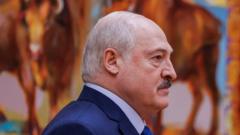The upcoming presidential election in Belarus reveals a populace resigned to enduring an unyielding political landscape dominated by the long-time leader.
Lukashenko's Power Solidifies as Indifference Takes Hold in Belarusian Elections

Lukashenko's Power Solidifies as Indifference Takes Hold in Belarusian Elections
With looming elections, Belarusians exhibit apathy amidst Lukashenko's unchallenged reign.
Amidst a wintry backdrop in January 2025, the Belarusian capital, Minsk, lacks the electric atmosphere typically associated with elections. Instead, the nation braces for yet another predetermined outcome as Alexander Lukashenko, who has presided over Belarus since 1994, is poised to secure a seventh term without contest.
Campaigning is virtually absent, with few embellishments like billboards or public endorsements visible across the city. Lukashenko himself has expressed indifference toward the electoral process, indicating he is too occupied to follow the campaign at all. "I've got no time," he remarked during a recent visit to the Minsk Automobile Plant, where he received a symbolic gift of an axe to chop wood, a nod to his rugged image that garnered laughs and applause from assembled workers.
This is in stark contrast to the atmosphere in 2020 when widespread protests erupted following an election widely deemed fraudulent. Back then, Lukashenko encountered open disdain from workers, with video footage capturing them chanting for him to "go away" as he visited various industrial sites. The official results declared 80% of the vote in favor of Lukashenko, inciting an uproar that led to a brutal crackdown on dissent, resulting in thousands of arrests and the eventual repression of civil unrest.
Despite a heavy atmosphere of repression, the European Parliament has made clear its position, denouncing the forthcoming election as a "sham." The credibility of the electoral process is further tainted as major opposition figures remain behind bars or in exile, leaving a political landscape devoid of real challengers.
Among the nominal candidates is Sergei Syrankov, head of the Communist Party of Belarus, who candidly admits to supporting Lukashenko, framing his candidacy as an extension of an alliance rather than a choice for leadership. Similarly, Oleg Gaidukevich, of the Liberal-Democratic Party, echoes the inevitability of Lukashenko’s victory, viewing his role more as a tactical positioning for future elections rather than a genuine political competition.
As reporters navigate the sentiments of citizens, a dominant fear emerges among them: instability. Residents like welder Sergei and local Zenaida voice their reluctance toward change, citing the chaos in neighboring Ukraine as a cautionary tale. "I want a stable salary, stability in the country," one resident states, reflecting a collective hesitance toward any turmoil that might accompany a leadership transition.
In an environment marked by anxiety, elections in Belarus illustrate more than just a political contest; they reveal a society caught between the devil they know and the uncertainty of an untested future, all reinforcing Lukashenko’s grip on power in a climate where dissent has been effectively silenced.
Campaigning is virtually absent, with few embellishments like billboards or public endorsements visible across the city. Lukashenko himself has expressed indifference toward the electoral process, indicating he is too occupied to follow the campaign at all. "I've got no time," he remarked during a recent visit to the Minsk Automobile Plant, where he received a symbolic gift of an axe to chop wood, a nod to his rugged image that garnered laughs and applause from assembled workers.
This is in stark contrast to the atmosphere in 2020 when widespread protests erupted following an election widely deemed fraudulent. Back then, Lukashenko encountered open disdain from workers, with video footage capturing them chanting for him to "go away" as he visited various industrial sites. The official results declared 80% of the vote in favor of Lukashenko, inciting an uproar that led to a brutal crackdown on dissent, resulting in thousands of arrests and the eventual repression of civil unrest.
Despite a heavy atmosphere of repression, the European Parliament has made clear its position, denouncing the forthcoming election as a "sham." The credibility of the electoral process is further tainted as major opposition figures remain behind bars or in exile, leaving a political landscape devoid of real challengers.
Among the nominal candidates is Sergei Syrankov, head of the Communist Party of Belarus, who candidly admits to supporting Lukashenko, framing his candidacy as an extension of an alliance rather than a choice for leadership. Similarly, Oleg Gaidukevich, of the Liberal-Democratic Party, echoes the inevitability of Lukashenko’s victory, viewing his role more as a tactical positioning for future elections rather than a genuine political competition.
As reporters navigate the sentiments of citizens, a dominant fear emerges among them: instability. Residents like welder Sergei and local Zenaida voice their reluctance toward change, citing the chaos in neighboring Ukraine as a cautionary tale. "I want a stable salary, stability in the country," one resident states, reflecting a collective hesitance toward any turmoil that might accompany a leadership transition.
In an environment marked by anxiety, elections in Belarus illustrate more than just a political contest; they reveal a society caught between the devil they know and the uncertainty of an untested future, all reinforcing Lukashenko’s grip on power in a climate where dissent has been effectively silenced.






















